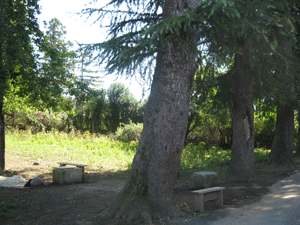Salome Achba
Problem that we are writing about is created by a fir-tree situated in approximately 4 meters from the building of compact settlement of IDPs. In reality it is a cedar, but we call it a fir-tree since this is how it is known for IDPs and for public figures connected to the tree with tricks of bureaucracy.
As the residents of building state, “fir-tree” is withering, it might fall down, damage the building and endanger the lives of its residents. IDPs asked different state organs to cut down the building numerous times, but the problem has not been solved yet.
On May 23rd, the storm toppled a cedar planted near the building. The cedar entirely broke down the part of its roof. Malashkhia family lives in a house covered by tarpaulin as a result.
There is one more similar “fir-tree” near the building. IDPs fear that it will fall down and damage the house. “When the wind blows, we look at it with great fear. We can not let children play in the yard. Even the breeze makes it move. It can fall down and endanger our lives,” – stated Shorena Malashkhia. Her family was presented with a tent by the UN office, but they can’t use it since the water gets damped beneath it.
Residents of #9 Gori St have been sending letters, requests and demands to local government since 2008 to cut the tree.
Everything is vain. The solution of very simple problem at one glance is hindered by bureaucracy barrier. The services obliged to solve this issue are redirecting people to different state organs. Everybody states simultaneously that the solution of this problem does not belong to their competence. It has been three years now residents of Gori St are whirling around the same circle.
According to law, Zugdidi municipality is obliged to cut down the damaged tree and provide the relevant money from budget. But as the deputy governor Darejan Gabedava stated she can not solve this problem since the building is not under municipality’s balance. It is owned privately, thus the permission of cutting should be issued by its owner.
Building inhabited by compactly settled IDPs is a Zugdidi branch of joint-stock company “Saktransgasmretsvi.” As the company director Devi Machaidze stated “Saktransgasmretsvi” and its Zugdidi branch “Sakburgheothermi” belong to state, not to private ownership.
As for the issue of cutting down the tree, Machaidze stated that “Saktransgasmretsvi” is not against cutting down the tree, but it can not order it directly since the building is under state ownership.
In the IDP agency of Samegrelo-Adjara-Zemo Svaneti we were told that this building is sequestrated and state can not govern it.
Before the state organs decide to whose ownership the building belongs to in reality, the IDPs are struggling with this bureaucracy: “Everybody directs us to someone else. We do not know who to address anymore?! Before they take measures, the tree will fall down and someone will get hurt,” – complains Shorema Malashkhia – the IDP living nearest to the “fir-tree.”
What if IDPs are fed up one day and cut down the tree, will the relevant officials issue the fine in that case for cutting tree without permission?
IDPs don’t have answer to this question.




